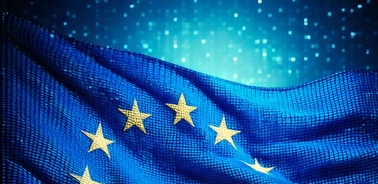- Home
- News And Events
- News
- Reclaiming The Eu’s Digital Sovereignty Through Strategic Alliances
Reclaiming the EU’s Digital Sovereignty through Strategic Alliances

In the 13th policy paper of our 'The Digital Revolution and the New Social Contract' project, we explore how the EU can leverage the 'Brussels effect' to secure its digital sovereignty and strengthen its global standing.
Digital technology is at the epicenter of what Ursula von der Leyen described as 'the new era of harsh geostrategic competition' during her address at the World Economic Forum. In this landscape, states are engaged in an intense contest to dominate emerging technologies, often at the expense of fundamental rights and democratic governance. Without a proactive regulatory strategy, the digital economy risks being shaped either by authoritarian regimes or by unregulated corporate powers, both of which could undermine Europe’s foundational values.
From Passive Influence to Strategic Alliances
According to the author of our latest paper, Ingrid Schneider (University of Hamburg), for the EU to maintain its position as a key player in the evolving geopolitical digital landscape, it must move beyond passive regulatory influence. Instead, it should actively forge strategic alliances with like-minded nations—both in the Global North and South—to shape a competitive and sustainable digital economy grounded in human rights and the rule of law.
By taking decisive action, forging strategic alliances, and offering an alternative to the polarized U.S.-China digital landscape, the EU can steer the future of digital governance toward a fair, open, and human-centric model.
The EU as a regulatory superpower
Rooted in its attractive consumer market and robust regulatory framework, the EU has already compelled major U.S. tech companies to modify their terms of service and extended digital governance standards into Global South nations. This phenomenon, known as the Brussels Effect, is best illustrated by the General Data Protection Regulation (GDPR), which forced companies like Meta to overhaul their privacy policies and data handling practices globally.
To cement its status as a regulatory superpower capable of setting global standards, the EU must continue to champion these foundational values through the enforcement of the Digital Services Act (DSA), the Digital Markets Act (DMA), and the EU AI Act. However, to maximize its global influence, the EU must do more than just enforce these laws within its own borders; it must also ensure their adoption in key international markets through strategic regulatory diplomacy.
Strengthening EU Regulatory Influence in Global Digital Governance
To enhance its regulatory influence, the EU must establish collaborative partnerships with key global players. The BRICS countries and other nations in the Global South are becoming increasingly important in shaping digital governance. While BRICS is often perceived as being dominated by China, many member states share the EU’s interest in curbing the power of Big Tech and creating a fairer digital economy.
However, regulatory priorities in these regions vary significantly. Instead of expecting uniform adoption of EU frameworks, the EU should offer flexible and adaptable applications of its digital regulations, fostering ongoing dialogue and capacity-building initiatives that align with local governance structures.
Strategic Imperatives: A Three-Pillar Approach
To navigate the escalating U.S.-China tech rivalry while asserting its influence in the global digital order, the EU should focus on three key priorities:
- Strengthen Internal Regulatory Coherence: The EU must ensure rigorous and consistent enforcement of the GDPR, DSA, DMA, and AI Act. Without internal coherence, it will struggle to promote these regulations abroad.
- Forge Strategic Alliances Based on Shared Values: The EU should collaborate with countries that share its commitment to democratic digital governance. This means engaging with G20 members, the WTO, and UN-led initiatives like the Global Digital Compact to advance a rules-based global digital order.
- Promote a ‘Third Way’ in Global Digital Governance: Rather than aligning with the U.S.’s laissez-faire approach or China’s state-controlled model, the EU should offer a distinct ‘Third Way’—one that balances innovation with democratic safeguards. This approach should position the EU as the leading global standard-setter for responsible digital governance.
The Brussels Effect is powerful—but it must be actively reinforced through global partnerships and strategic leadership. Only by embracing this role can the EU secure its digital sovereignty, protect democratic institutions, and build a digital future rooted in human rights, innovation, and fairness.